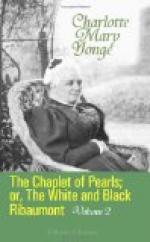Had the little Baronne de Ribaumont been lodged in a tapes-tried chamber, between curtains of velvet and gold, with a beauffet by her side glistening with gold and silver plate, as would have befitted her station, instead of lying on a bed of straw, with no hangings to the walls save cobwebs and hay, and wallflowers, no beauffet but the old rickety table, no attendants but Nanon and M. Gardon, no visitors but the two white owls, no provisions save the homely fare that rustic mothers lived upon—neither she nor her babe could have thriven better, and probably not half so well. She had been used to a hardy, out-of-door life, like the peasant women; and she was young and strong, so that she recovered as they did. If the April shower beat in at the window, or the hole in the roof, they made a screen of canvas, covered her with cloaks, and heaped them with hay, and she took no harm; and the pure open air that blew in was soft with all the southern sweetness of early spring-tide, and the little one throve in it like the puff-ball owlets in the hayloft, or the little ring-doves in the ivy, whose parent’s cooing voice was Eustacie’s favourite music. Almost as good as these her fellow-nestlings was the little Moonbeam, la petite Rayonette, as Eustacie fondly called this light that had come back to her from the sunshine she had lost. Had she cried or been heard, the sounds would probably have passed for the wailings of the ghostly victims of the Templars, but she exercised an exemplary forbearance in that respect, for which Eustacie thought she could not be sufficiently admired.
Like the child she was, Eustacie seemed to have put care from her, and to be solely taken up with the baby, and the amusement of watching the owl family.
There was a lull in the search at this moment, for the Chevalier had been recalled to Paris by the fatal illness of his son-in-law, M. de Selinvine. The old soldier, after living half his life on bread and salad, that he might keep up a grand appearance at Paris, had, on coming into the wealth of the family, and marrying a beautiful wife, returned to the luxuries he had been wont only to enjoy for a few weeks at a time, with in military occupation of some Italian town. Three months of festivities had been enough to cause his death; and the Chevalier was summoned to assist his daughter in providing for his obsequies, and in taking possession of the huge endowments which, as the last of his race, he had been able to bequeath to her. Such was the news brought by the old nurse Perrine, who took advantage of the slackening vigilance of the enemy to come to see Eustacie. The old woman was highly satisfied; for one of the peasants’ wives had—as if on purpose to oblige her Lady—given birth to twins, one of whom had died almost immediately; and the parents had consented to conceal their loss, and at once take the little Demoiselle de Ribaumont as their own— guarding the secret till her mother should be able to claim her. It was so entirely the practice, under the most favourable circumstances, for French mothers to send their infants to be nursed in cottages, that Perrine was amazed by the cry of angry refusal that burst from Eustacie: ’Part with my child! leave her to her enemies!—never! never! Hold your tongue, Perrine! I will not hear of such a thing!’




